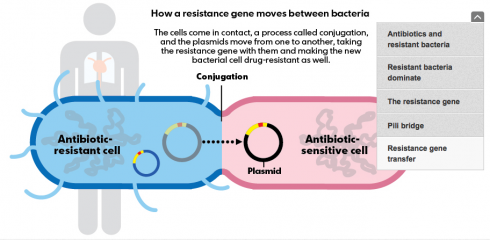Many of the arguments against the use of genetically modified food have to do with how new and untested the process is. We do not know enough about how these modifications could impact us or other non-target species. For example, could those mutant genes be passed on to weeds around the target species making them resistant to herbicides or causing them to grow faster? Indeed it would now seem that there is widespread proliferation around the world of resistant weeds. Also, could the genes be transferred to bacteria in our body when we eat them? This is, after all, how many species of bacteria have acquired resistance from other bacteria.
I'm not sure if something similar could even happen between digested plant-food and bacterial cells, though it has been shown that such transfer is at least possible between bacterial and plant cells. How GMO's impact "non-target species" is probably the biggest concern, and once those genes are out there there's no getting them back.
http://www.guardian.co.uk/environment/2012/sep/28/study-gm-maize-cancer
There is also a certain aroma of corruption on part of agribusinesses such as Monsanto. It seems many studies that are widely cited by these businesses to support GM foods were funded by those businesses or their affiliations. It is hard to put our complete trust in huge corporations, and we are right cast them a skeptical eye.
The debate, much like the debate taking place around climate change, has been framed in a pro-science/anti-science light, with anti-GMO views being painted as anti-scientific, and studies such as the Seralini study relentlessly attacked. It's incredibly hard to tease it all apart and find exactly where the science is pointing, and much of that could be due to the relative newness of the subject. We are nowhere near being able to say anything with certainty regarding the long-term effects of genetic alteration in food products; the experiment needs more time.
I get the sense that all the lashing out at GMO skeptics is not entirely fair. Here is a good article from the opinion that the pro-GMO lobby are committing their own scientific errors:
http://www.soilassociation.org/motherearth/viewarticle/articleid/4752/the-pro-gm-lobbys-seven-sins-against-science
On the other side, here is a list of the independent studies that show GM foods as being safe:
http://www.biofortified.org/genera/studies-for-genera/independent-funding/
One interesting study of note here is this one which concludes that transgenesis actually has less of an impact on gene expression then normal breeding:
"These results suggest that the presence of the transgenes did not significantly alter gene expression and that, at this level of investigation, transgenic plants could be considered substantially equivalent to untransformed parental lines."
The arguments for GM foods are usually built around the idea that they could be the solution to world hunger. You could engineer plants to grow faster, to grow in less fertile soil, to be more nutritious. Some studies have shown that herbicide use has decreased since the introduction of GM foods, though I'm finding conflicting results about whether or not overall yield of crops has increased - it doesn't seem so. There does seem to be something of a consensus, if you factor in all the research and studies, that GM food is no less safe than normally bred plants, though there have been a few instances in the past 20 years of deaths linked to modified genes in Japan and the US.
In the end this is another one of those extremely complicated and convoluted debates. My opinion, when it comes to our personal health, is that it is alright to be cautious, and to perhaps limit your exposure to GMO's, but at the same time avoid panic and the-end-is-nigh type rhetoric. Probably the fact of the matter is that GMO's are going to be part of our future, I just wish that there was more reservation about putting these products into use without a more complete understanding. At the end of the day it seems that the paradigm of 'growth, growth, growth' trumps all other concerns. If there is a profit to be made, then caution is thrown to the wind.
If you're interested in reducing your consumption of GMO's:
http://cban.ca/FAQs/How-Can-I-Avoid-GM-Foods
And some more links relative to the discussion:
1)http://www.ncbi.nlm.nih.gov/pmc/articles/PMC1083956/
Public views on GMOs: deconstructing the myths
Stakeholders in the GMO debate often describe public opinion as irrational. But do they really understand the public?
2)http://www.pbs.org/wgbh/harvest/exist/Should We Grow GM Crops?
This is a pretty cool website. Scroll down to the bottom and answer the question, 'should we grow GM crops?' Depending on your answer you'll get a different for or against argument. Then you get a chance to vote again. Or you could just look at all for and against arguments at once.
3)http://www.reddit.com/r/biology/comments/1ao9ee/are_you_pro_or_against_gmo_do_you_have_any/
These reddit discussions are very interesting as well, and lots of points are raised on both sides
good luck

http://io9.com/nature-devotes-an-issue-to-genetically-modified-organis-486327304
ReplyDeletehttp://www.nature.com/news/specials/gmcrops/index.html